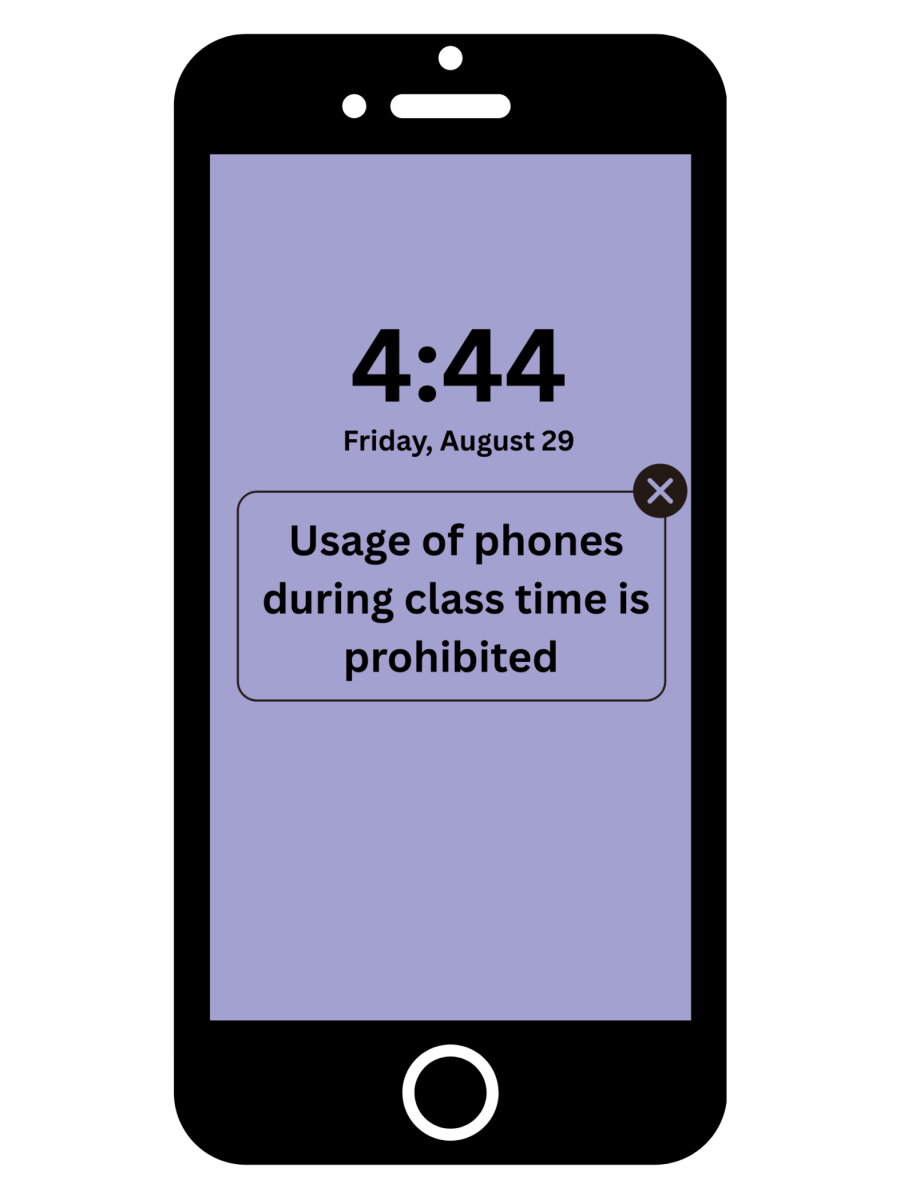
Graphic by Haley Smith
When the school bells signal the start of class at Manhattan High School, students surrender their cell phones to an over-the-door holder where the devices remain until the next passing period. This protocol is part of a new policy adopted by MHS this year, which prohibits students from using personal electronic devices during class.
“The new policy is that they can’t have any personal electronic device, so phones [are] an obvious one, but also things like smartwatches,” Kristy Nyp, journalism and public speaking teacher at MHS said. “ … They can’t have headphones or small enough gaming systems they might be carrying with them. They also can’t bring their own laptop or iPad to school. There is a school-issued iPad for every kid, and then we have several computer labs.”
As of August 2025, 34 states have policies banning or limiting students’ use of personal electronic devices in the classroom, excluding Kansas. The faculty at Manhattan High School wanted to create their own rules.
“We didn’t want to be in a position of potentially getting forced to create a policy, so our administration is trying to get ahead of that by coming up with a policy that works within our school so we don’t have the complaints that force our legislature to do something like that,” Nyp said.
All teachers at MHS are required to follow the protocol for electronics, and Nyp said they are united in their efforts.
“I haven’t seen anyone be lenient about it,” Nyp said. “That’s one thing that we all understood right from the beginning, is that we have to be together on this, collectively.”
The students, however, have mixed feelings about the policy. MHS sophomore Kaliyah Lyle said she misses listening to music while doing classwork.
“I feel like we should at least have it during work time, because at the end of the day, it’s just getting work done,” Lyle said. “Some people need music to help them focus, but we have to listen to our teacher’s music, which is terrible.”
Although she heard some student complaints, Nyp said most seem to understand the policy is a school-wide decision based on research. For example, the Blue Ribbon Task Force, comprised of Kansas state/school board members, students, teachers, principals and parents, published a report recommending Kansas schools prohibit students from using personal electronics from “bell-to-bell,” meaning students would be required to store their devices all day, including during passing period and other breaks.
Payton Lynn, employee of the Kansas State Department of Education, said the task force came to their recommendation by reviewing numerous studies and scientific reports.
“A lot of times we start out by trying to find people who have some sort of expertise, or in some cases, brought in school district personnel who had different types of policies for electronic devices in their school to get their perspective,” Lynn said.
Evidence shows students retain more information when they’re not looking at their phones.
“A lot of the research that the task force had focused on was about the splitting attention that having phones in school can cause, so students are not learning as much in class because there are distractions from using their cell phones or the notifications that are going off,” Lynn said. “Student outcomes and student learning were really important to them.”
Nyp said in the few weeks since school started, she’s noticed a shift in the classroom energy when students are not on their phones.
“During class, I do think it looks different if you walk down the halls and you go past a classroom where the door is open, you used to see a majority of kids on phones, even while the teacher would be lecturing or having an activity for them,” Nyp said. “Kids just couldn’t stop themselves. Now, you walk past classrooms and the kids are at least paying attention.”
Nyp said a lack of electronics also encourages students to collaborate and communicate.
“There’s just more conversation,” Nyp said. “It was very common to have a room with 20 or 25 kids in it after they were finished with something, and it was just silent because they were all on phones, and now there’s a lot of chatter, which is kind of nice to hear, actual interaction between kids. I don’t mind that.”
Nyp said she’s hopeful for the future and thinks the new electronic device policy could change the way MHS teachers structure their courses.
“Teachers have talked a lot between different groups about how much stuff we used to get through in a class and how gradually over the past few years it seems like we get less and less accomplished,” Nyp said. “ … We’re keeping an eye out for whether part of that is the kids were just so quickly distracted that we couldn’t give them as much to do and that we might see more productive time for them, so there’s not so much downtime where they don’t have anything that they’re working on. We might be able to give them more information and push them a little bit further.”